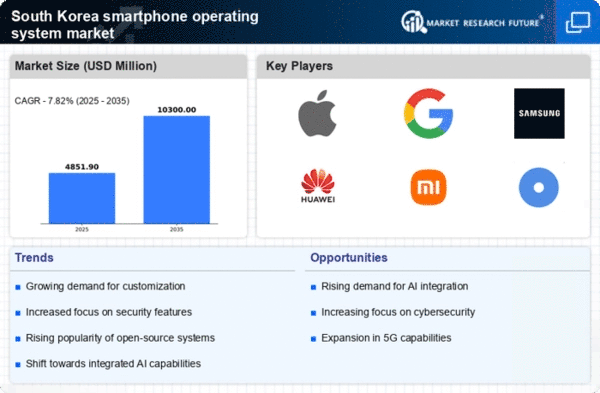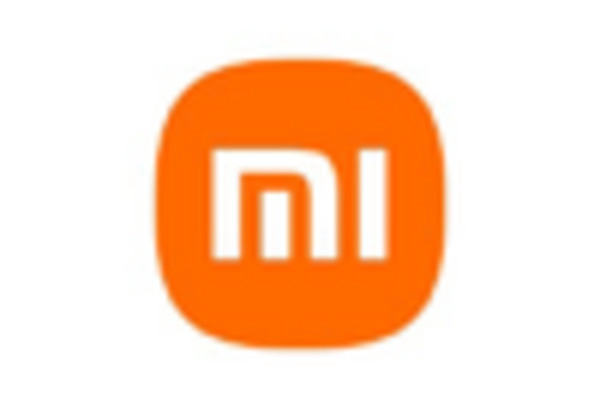Rapid Technological Advancements
The smartphone operating-system market in South Korea is experiencing rapid technological advancements, which significantly influence consumer preferences and market dynamics. Innovations in hardware and software are driving the demand for more sophisticated operating systems that can leverage these advancements. For instance, the introduction of 5G technology has prompted operating system developers to optimize their platforms for enhanced connectivity and speed. As of 2025, approximately 80% of smartphone users in South Korea are expected to utilize 5G-enabled devices, necessitating operating systems that can fully exploit this technology. This trend indicates a growing need for continuous updates and improvements in the smartphone operating-system market, as manufacturers strive to meet the evolving expectations of tech-savvy consumers.
Consumer Demand for Customization
Consumer demand for customization is a significant factor shaping the smartphone operating-system market in South Korea. Users increasingly seek personalized experiences that reflect their individual preferences and lifestyles. This trend has led to the development of operating systems that offer extensive customization options, allowing users to modify interfaces, functionalities, and features according to their needs. As of 2025, surveys indicate that over 70% of smartphone users in South Korea prioritize customization capabilities when selecting an operating system. This growing expectation compels developers to innovate and provide more flexible solutions, thereby enhancing user satisfaction and loyalty within the smartphone operating-system market.
Integration of Artificial Intelligence
The integration of artificial intelligence (AI) is a transformative driver in the smartphone operating-system market in South Korea. AI technologies are being increasingly embedded into operating systems to enhance user experiences through personalized recommendations, voice recognition, and predictive analytics. As of 2025, it is estimated that over 60% of smartphone users in South Korea will utilize AI-driven features, indicating a strong preference for intelligent systems that can learn and adapt to user behaviors. This trend compels operating system developers to invest in AI capabilities, thereby fostering innovation and competitiveness within the smartphone operating-system market. The potential for AI to revolutionize user interactions presents both challenges and opportunities for operating system providers.
Increased Mobile Application Development
The surge in mobile application development is a crucial driver for the smartphone operating-system market in South Korea. With a vibrant ecosystem of developers creating diverse applications, operating systems must adapt to support a wide range of functionalities and user experiences. As of 2025, the number of mobile applications available in South Korea is projected to exceed 3 million, creating a competitive landscape that compels operating system providers to enhance their platforms. This proliferation of applications not only enriches user engagement but also drives the demand for operating systems that can seamlessly integrate with various app ecosystems. Consequently, the smartphone operating-system market must continuously evolve to accommodate this growing demand for innovative applications.
Focus on Sustainability and Eco-Friendliness
The focus on sustainability and eco-friendliness is emerging as a vital driver in the smartphone operating-system market in South Korea. As consumers become more environmentally conscious, there is a rising demand for operating systems that support sustainable practices, such as energy efficiency and reduced electronic waste. Manufacturers are increasingly integrating features that promote eco-friendly usage, such as battery optimization and resource management tools. By 2025, it is anticipated that operating systems that prioritize sustainability will capture a larger share of the market, as consumers actively seek products that align with their values. This shift towards eco-friendliness is likely to influence the development strategies of operating system providers in the smartphone operating-system market.
















